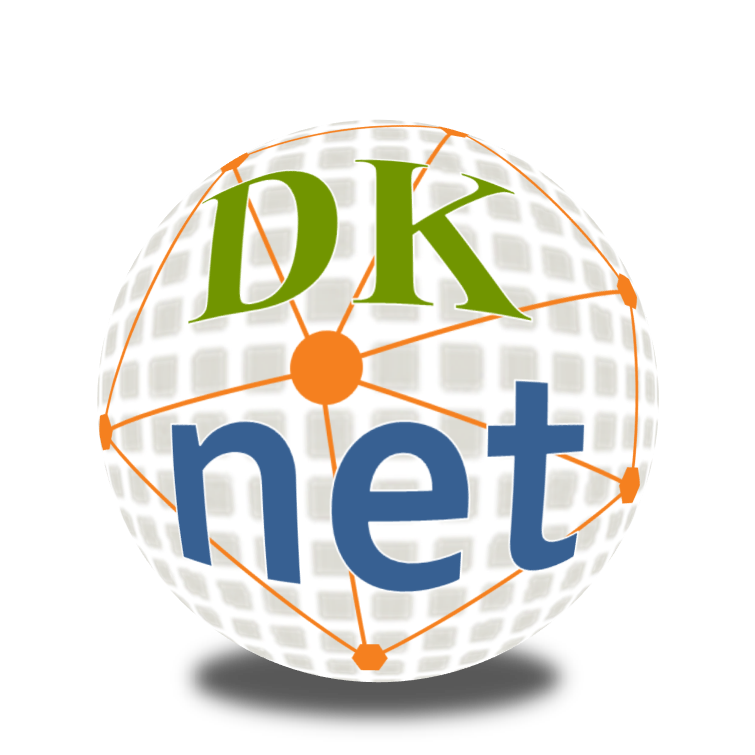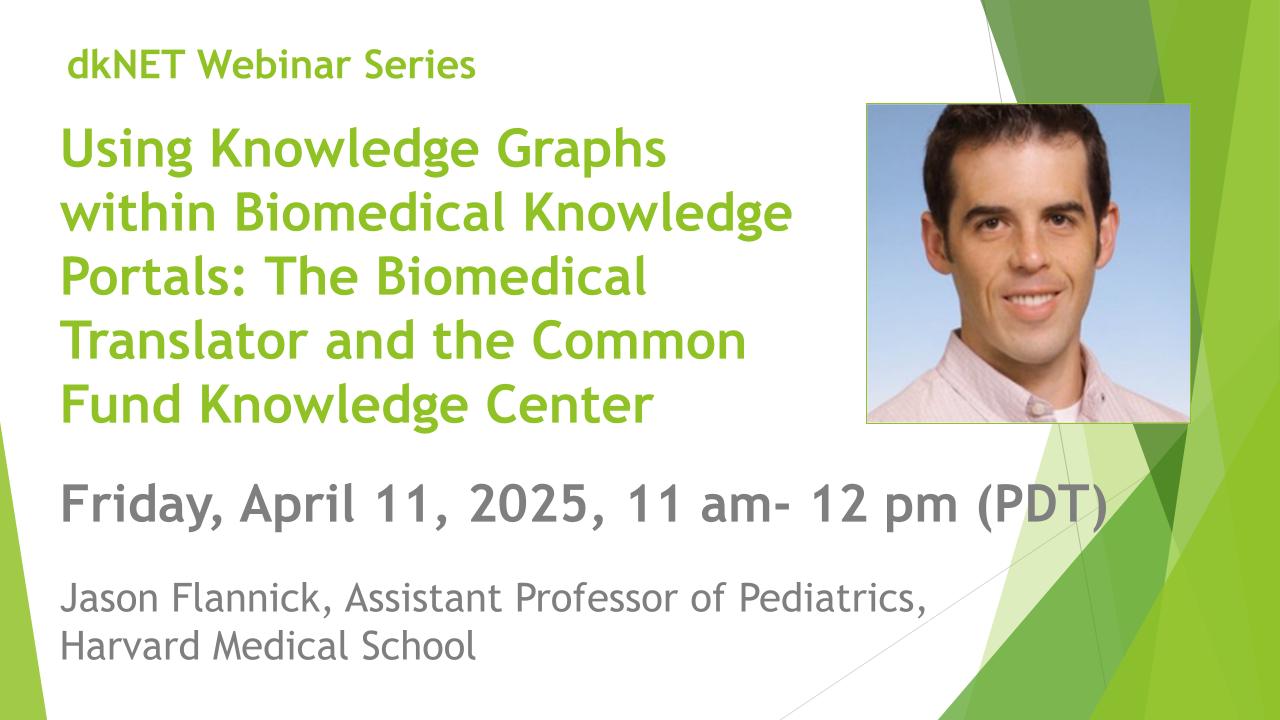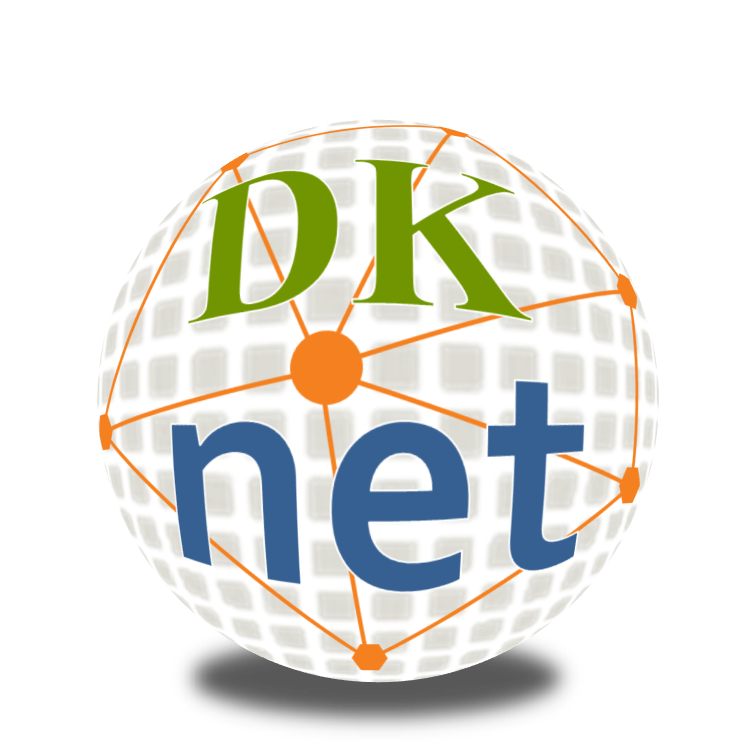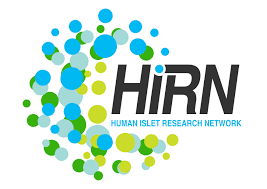Leaving Community
Are you sure you want to leave this community? Leaving the community will revoke any permissions you have been granted in this community.
dkNET community events and announcements in May, 2024
Dear dkNET Community,
dkNET provides updates on activities of interest to the NIDDK-supported community. You could keep up to date on these activities through our Twitter feed @dkNET_info, through our Community Calendar, or through dkNET e-mail list. If you have an event or funding opportunities you'd like to advertise, please contact us info_at_dknet.org.
dkNET News
- Upcoming webinars:
- The 4D Nucleome Data Portal, presented by Dr. Andrew Schroeder on Friday, May 10, 2024, 11 am - 12 pm PT
- Single Cell Multi-Omics Analysis of Beta Cell Heterogeneity, presented by Dr. Yan Li on Friday, May 17, 2024, 11 am - 12 pm PT
Events in May 2024
May. 01-03, 2024
Keystone Symposia: AI in Biomedicine (Virtual)
Artificial intelligence (AI) and machine learning are rapidly advancing biomedicine by enabling novel insights into disease mechanisms, earlier diagnosis, improved prognostics, and enhanced precision medicine. This meeting will showcase cutting-edge applications of AI across divers e areas of biomedicine including oncology, neurology, cardiology, immunology, and genetics. Sessions will highlight real-world examples of how AI can address long-standing challenges in biomedicine through automated analysis of complex biomedical data. Talks will focus on the near-term translatability of AI technologies and practical hurdles that must still be overcome. Discussions will also address responsible and ethical implementation of A I in biomedicine. Speakers will represent leading researchers across academia, industry, clinical medicine, and government. Collectively they will provide a comprehensive overview of the current state and future directions of AI in transforming biomedicine to improve human health.
More information: https://www.keystonesymposia.org/conferences/conference-listing/meeting?eventid=7111
May. 03, 2024
dkNET Office Hours: NIH Data Management and Sharing Mandates
For all proposals submitted on/after January 25 2023, NIH requires the sharing of data from all NIH funded studies. Do you have appropriate data management practices and sharing plans in place to meet these requirements? Have questions or need some help? Join the dkNET office hours to l earn about NIH’s policy (NOT-OD-21-013) and resources that could help.
Register now! https://uchealth.zoom.us/meeti ng/register/tZMscOqtrD8qGdOfb48YCremcTtS4zhpDcdi
May. 08, 2024
Diabetes Research Center Virtual Seminar Series: Adipose Tissue Plasticity and Translational Regulation
Title: Adipose Tissue Plasticity and Translational Regulation
Speaker: Claudio J. Villanueva, PhD, Department of Integrative Biology and Physiology, Co-Director of IRACDA@UCLA Program; Director of Research Support Core for LIFT-UP College of Life Sciences, University of CA, Los Angeles.
More information: https://diabetes-virtual-seminar.org/
May. 10, 2024
dkNET Webinar: The 4D Nucleome Data Portal
Join dkNET Webinar on Friday, May 10, 2024, 11 am - 12 pm PT
Presenter: Andrew Schroeder, PhD. Project Manager & Senior Data Curator of 4D Nucleome Data Portal, Harvard Medical School
Abstract
The Common Fund 4D Nucleome program, currently in its 9th year\ , is a consortium of researchers that aims to understand the principles behind the three-dimensional organization of the nucleus and how this organization can change over time to affect a variety of cellular processes. The 4D N Data Portal (data. 4dnucleome.org) is an expanding resource hosting data generated by the 4DN Network and other reference nucleomics data sets. The portal provides tools for search, exploration, visualization, and download. An overview of the data portal, highlighting available data, how it can be found, visualized and used for analyses will be presented.
The top 3 key questions that the 4DN data portal can answer:
1. Are there significant sites of long-range chromatin contacts near my gene or region of interest?
2. What omics datasets are available for my tissue of interest?
3. Are there imaging datasets available that are relevant to my tissue of interest?
Dial-in Information:
https://uchealth.zoom.us/meeting/register/tZIodu-qpzIqEtReuoLvGNCfMoxa4PfsxsXb
More information: https://dknet.org/about/blog/2745
May. 12, 2024
Abstract Submission Deadline: American Thyroid Association Annual Meeting
The 2024 ATA Annual Meeting will be the largest gathering of thyroidologists in the world! Join us in Chicago, Illinois to connect, network, and share the latest updates in research and clinical care. We’ll also celebrate our award winners and leadership through various sessions and networking events. Meeting dates: October 30 - November 3, 2024.
Location: Chicago, IL, USA
More information: https ://www.thyroid.org/2024-annual-meeting/
May. 16, 2024
NIH ODSS Funding Opportunity Application Due: Advancing Health Rese arch through Ethical, Multimodal AI
The Advancing Health Research through Ethical, Multimodal AI Initiative aims to develop ethically focused and data-driven multimodal AI approaches to more closely model, interpret, and predict complex biological, behavioural, and health systems and enhance our understanding of health and the ability to detect and treat human diseases. Administered from the NIH Office of Data Science Strategy (ODSS), the program will establish a portfolio of innovative projects that address systems level biomedical challenges using collaborative and participatory approaches for multimodal AI that will elucidate unique opportunities, risks, and challenges.
More information: https://dknet.org /about/dknetnews/2735
May. 17, 2024
dkNET Webinar: Single Cell Multi-Omics Analysis of Beta Cell Heterogeneity and Differentiation
Join dkNET Webinar on Friday, May 17, 2024, 11 am - 12 pm PT
Presenter: Yan Li, PhD, Associate Professor, Department of Genetics and Genomics, Case Western Reserve University
Abstract
In human tissues, not only different cell types are present in a tissue, but the same cell type from the same person may also exist in different states depending on various factors such as environment, age, or disease state. The concept of cellular heterogeneity has been actively pursued in some diseases (e.g., cancer stem cell). However, the presence and disease relevance of cellular heterogeneity in non-proliferating cell types, such as pancreatic beta cells are not well studied. We are using single cell RNA-seq, single cell ATAC-seq, Hi-C, and CRISPR technologies to investigate this interesting question. Another interest in the lab is to exp lore pluripotent stem cell (PSC) as a model for diabetes research and therapy. We performed the first single cell RNA-seq study to map the entire differentiation process from human ESC to the final stage, which include both endocrine and non-endocrine cell populations. This study shed light on the strategies to improve beta-cell differentiation for therapeutics. It also makes another conceptual contribution to the diabetes field that many DNA variants may cause disease risk during the development.
The top 3 key questions that the 4DN Data Portal can answer:
1. What are the cell type specific gene expression patterns within human islets?
2. What are the dynamic gene expression patterns during beta cell differentiation from embryonic stem cell?
3. scRNA, scATAC and HiC omics datasets generated from human islets relevant to Type 2 Diabetes.
Resource link: Beta Cell Hub https://hivie w.case.edu/public/BetaCellHub/differentiation.php
Dial-in Information: https://uchealth.zoom.us/meeting /register/tZUsc-uvrDkoHt2I3YdD8RAfyws35dqZC7rQ
More information: https://dknet.org /about/webinar
May. 28-29, 2024
NIDDK Virtual Meeting: Gut Microbiota and Kidney Disease
The gut microbiome is a dynamic ecosystem that reflects body’s response to various systemic pathologies, including kidney diseases. However, its value as a determinant of kidney diseases has rarely been investigated. This workshop will address the overall impact of microbiome/microbiota on kidney diseases with specific focus on their role as markers, mediators or amplifiers of kidney function or dysfunction. In addition, the workshop will explore biological/mechanistic interplay between the kidney (in disease) and the gut microbiome. The workshop will also discuss a roadmap for future studies, which will help define novel associations between gut microbiota and kidney diseases, identify mechanisms linking gut microbiota and kidney diseases, and assessing the clinical value of gut microbiota in diagnosing and treating kidney diseases.
More information: https://www.niddk.nih.gov/news/meetings-workshops/2024/gut-microbiota-and-kidney-disease-2024
Funding Opportunities Information and Deadlines in May 2024
May. 27, 2024
NIDDK Funding Opportunity Letter of Intent Due: Continuous Ketone Monitoring for the Safe Use of Sodium-glucose Cotransporter-2 Inhibitors in Type 1 Diabetes (R01 Clinical trial Required)
Sodium-glucose co-transporter-2 inhibitors (SGLT2i) that were developed for the treatment of type 2 diabetes (T2D) have significant protective effects for cardiac and renal diseases for people with and without diabetes. However, SGLT2i are not currently approved for individuals with type 1 diabetes (T1D) and there is an increased risk of diabetic ketoacidosis (DKA) for this population. Despite this concern, these drugs are increasingly being prescribed off-label for people with T1D. Continuous ketone monitoring (CKM) is a rapidly evolving technology that could be utilized clinic ally to prevent DKA by an early warning of elevations in ketone levels. The purpose of this NOFO is to solicit applications for studies that will develop and test risk mitigation strategies that involve the clinical integration of CKM for the safe use of SGLT2i for people living with T1D so that the y may benefit from the cardiac and renal protection and glucose-lowering effects of this drug class. The NOFO will support short-term, clinical trial s to gain and disseminate knowledge on safety and glucose control with CKM and SGLT2i use. Possible topics include testing optimal insulin delivery in open and closed loop systems or multiple daily injections and developing clinical protocols to control or ameliorate elevated ketone levels in individuals with T1D who are receiving adjunct therapy with SGLT2i. Letter of Intent Due Date: May 27, 2024. Application Due Date: June 27, 2024.
More information: https://grants.nih.gov/grants/guide/rfa-files/rfa-dk-23-011.html
May. 28, 2024
CAIRIBU Funding Opportunity Application Deadline: CAIRIBU Collaboration Award
Applications for short-term, novel, high-risk proposals are requested by the CAIRIBU Interactions Core. Clinical trials are not allowed. Applications addressing multiple CAIRIBU research goals (see below) are prioritized. Up to 2 awards are available, each allows up to $50,000 direct research costs plus indirects (as negotiated by your institution). Applicants are eligible if they are or were affiliated with a CAIRIBU U54 George M. O’Brien Urology Center, a P20 Exploratory Center or FORWARD P20 Center, or KURe or KUroEpi Institutional Career Development Program, or other CAI RIBU initiative. Basic science projects and translational projects are especially welcome. Deadline: May 28, 2024. Project dates: 08/01/2024 to 07/31 /2025.
More information: https://cairibu.urology.wisc.edu/wp-content/uploads/sites/1064/2024/02/FINAL-March-2024-CAIRIBU-Collaboration-awards-description.pdf





